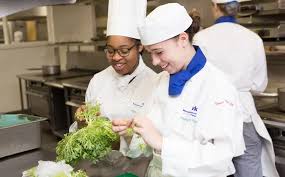Exploring the World of Good Culinary Schools
Embarking on a culinary journey is an exciting and rewarding experience for those passionate about the art of cooking. Whether you dream of becoming a professional chef or simply want to enhance your culinary skills, choosing the right culinary school is crucial to your success.
Good culinary schools offer a comprehensive curriculum that covers various aspects of the culinary arts, from basic cooking techniques to advanced gastronomy. Students have the opportunity to learn from experienced chefs, gain hands-on experience in state-of-the-art kitchens, and explore different cuisines from around the world.
One key aspect of good culinary schools is their emphasis on practical training. Students are given the chance to hone their skills through real-world experiences, such as working in professional kitchens, catering events, and participating in culinary competitions. This hands-on approach not only enhances students’ technical abilities but also prepares them for the fast-paced environment of the culinary industry.
Furthermore, good culinary schools provide a supportive learning environment that encourages creativity, innovation, and collaboration. Students are encouraged to experiment with ingredients, develop their own recipes, and explore new cooking styles under the guidance of experienced mentors.
Another important factor to consider when choosing a culinary school is accreditation. Accredited culinary schools adhere to high standards of quality and excellence in education. Graduating from an accredited institution not only enhances your credibility as a chef but also opens up more opportunities for career advancement.
In conclusion, good culinary schools play a vital role in shaping the future generation of chefs and food enthusiasts. By providing a solid foundation in culinary arts, fostering creativity and innovation, and offering practical training opportunities, these institutions empower students to pursue their passion for cooking and turn their dreams into reality.
Selecting the Finest Culinary School: Five Essential Tips for Aspiring Chefs in the UK
- Research the reputation and accreditation of culinary schools.
- Consider the curriculum and specialization areas offered by different schools.
- Look into the facilities, equipment, and resources available at each culinary school.
- Check the qualifications and experience of the instructors at the culinary schools.
- Evaluate the cost, financial aid options, and potential job placement opportunities provided by culinary schools.
Research the reputation and accreditation of culinary schools.
When considering good culinary schools, it is essential to thoroughly research the reputation and accreditation of each institution. Accreditation ensures that the school meets industry standards and provides quality education. By delving into the reputation of culinary schools, prospective students can gain valuable insights into the experiences of past students, the success rate of graduates, and the overall standing of the school within the culinary community. Choosing a well-respected and accredited culinary school can significantly impact one’s culinary education and future career opportunities.
Consider the curriculum and specialization areas offered by different schools.
When exploring good culinary schools, it is essential to consider the curriculum and specialization areas they offer. Each school may have a unique focus, ranging from classical French cuisine to molecular gastronomy or plant-based cooking. By researching the curriculum and specializations of different schools, aspiring chefs can align their interests and career goals with the programs that best suit their needs. Understanding the specific areas of expertise that each school emphasises allows students to tailor their culinary education to match their passions and aspirations within the diverse world of gastronomy.
Look into the facilities, equipment, and resources available at each culinary school.
When considering good culinary schools, it is essential to thoroughly examine the facilities, equipment, and resources offered by each institution. State-of-the-art kitchens equipped with modern appliances and tools can significantly enhance the learning experience and provide students with the necessary skills to excel in the culinary industry. Additionally, access to a wide range of ingredients, cooking stations, and industry-standard equipment can help aspiring chefs develop their techniques and creativity. By carefully assessing the facilities and resources available at different culinary schools, prospective students can make an informed decision that aligns with their educational goals and aspirations in the world of gastronomy.
Check the qualifications and experience of the instructors at the culinary schools.
When considering good culinary schools, it is essential to check the qualifications and experience of the instructors. Experienced and knowledgeable chefs can provide valuable insights, mentorship, and practical guidance to students as they navigate the world of culinary arts. Instructors with diverse backgrounds and expertise can offer a well-rounded education that covers various cuisines, techniques, and industry trends. By ensuring that the instructors at a culinary school are skilled professionals with a passion for teaching, students can benefit from a rich learning experience that prepares them for success in the competitive culinary industry.
Evaluate the cost, financial aid options, and potential job placement opportunities provided by culinary schools.
When considering good culinary schools, it is essential to evaluate not only the quality of education but also the financial aspects involved. Prospective students should carefully assess the cost of tuition, fees, and other expenses associated with attending culinary school. Additionally, exploring available financial aid options, such as scholarships, grants, and student loans, can help make culinary education more accessible. Furthermore, researching the potential job placement opportunities offered by culinary schools can provide valuable insights into post-graduation career prospects and industry connections. By thoroughly examining these factors, aspiring chefs can make informed decisions about selecting a culinary school that aligns with their academic and professional goals.

